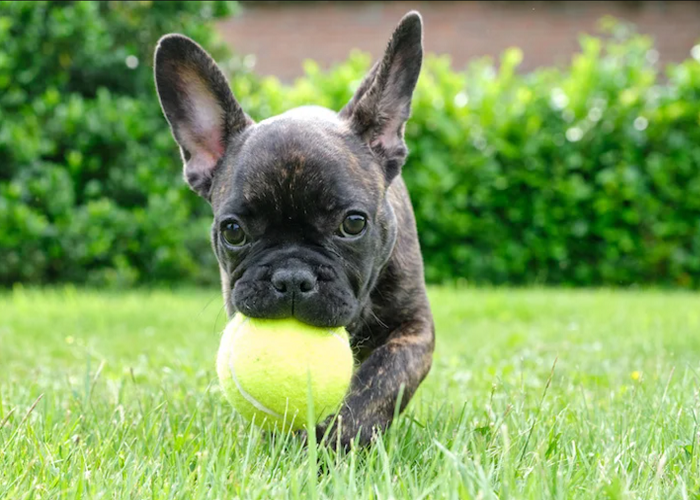Bringing a Frenchton puppy into your home is an exciting adventure filled with adorable moments, but it also comes with the responsibility of training. Proper training ensures your Frenchton grows into a well-behaved and happy companion. In this comprehensive guide, we’ll explore how to train Frenchton puppies effectively, from basic obedience to specialized skills so that you can enjoy a harmonious relationship with your furry friend.
Understanding Frenchton Puppies
Before we delve into training techniques, it’s crucial to understand the unique characteristics of Frenchton. Frenchtons are a mix of French Bulldogs and Boston Terriers, and they inherit a blend of traits from their parent breeds:
- Friendly and Affectionate: Frenchtons are known for their loving and sociable nature, making them great companions.
- Intelligent but Stubborn: They are smart dogs but can be a bit stubborn sometimes, requiring patience and consistency in training.
- Short Attention Span: Frenchton puppies can have short attention spans, so training sessions should be short and engaging.
- Sensitive: They are sensitive to their owner’s emotions, so positive reinforcement is particularly effective in training.
- Energetic but Not Hyperactive: Frenchtons have bursts of energy but are generally not hyperactive, making them suitable for various living situations.
Understanding these traits will help you tailor your training approach to your Frenchton’s needs and characteristics.
The Importance of Early Training
Training should start as early as possible when your Frenchton puppy comes home. Puppies are like sponges, absorbing information and forming habits quickly. By beginning training early, you can shape their behavior and prevent the development of undesirable habits.
Early training benefits include
- Establishing a Bond: Training sessions help build a strong bond between you and your puppy, fostering trust and communication.
- Preventing Behavioral Issues: Early training can prevent common behavioral issues like excessive barking, chewing, and house soiling.
- Socialization: Proper socialization at a young age ensures your Frenchton is comfortable and confident around people, other dogs, and various environments.
- Setting Expectations: Early training sets clear expectations for your puppy’s behavior, making it easier to live harmoniously together.
Basic Obedience Training
Basic obedience training is the foundation of a well-behaved Frenchton puppy. Start with these essential commands:
- Sit: Teach your puppy to sit on command. Use treats and praise to reinforce the behavior.
- Stay: Teaching your puppy to stay is crucial for safety. Begin with short intervals and gradually increase the duration.
- Come: Train your puppy to come when called. This command is vital for recall in various situations.
- Down: Teaching your puppy to lie down on command is useful for keeping them calm and well-behaved.
- Leave It and Drop It: These commands help prevent your puppy from picking up or chewing on undesirable objects.
- No Jumping: Discourage jumping on people by teaching your puppy to keep all four paws on the ground.
- Basic Manners: Encourage polite behavior, such as waiting patiently for food and not begging at the table.
Remember to use positive reinforcement techniques, rewarding your puppy with treats, praise, and affection when they successfully follow commands. Consistency and patience are key to successful obedience training. Offering Frenchton puppies for sale, go and get your home friend.
House Training Your Frenchton Puppy
House training, also known as potty training, is fundamental to raising a well-behaved Frenchton puppy. Here’s how to approach it:
- Establish a Routine: Stick to a consistent schedule for feeding, bathroom breaks, and playtime. Puppies thrive on routine.
- Watch for Signs: Be vigilant for signs that your puppy needs to go outside, such as sniffing, circling, or whining.
- Choose a Designated Area: Take your puppy to the same spot in your yard each time they need to eliminate. The scent will help them recognize it as the designated bathroom area.
- Praise and Rewards: When your puppy eliminates outside, offer praise and treats as positive reinforcement.
- Accidents Happen: Understand that accidents will occur during training. When they do, clean them up promptly to eliminate lingering odors that might attract your puppy back to the same spot.
- Be Patient: House training takes time, and every puppy progresses at their own pace. Avoid punishment for accidents, as it can create fear and anxiety.
Socialization: Building a Well-Balanced Pup
Socialization is a critical aspect of Frenchton puppy training. It involves exposing your puppy to various people, animals, environments, and situations to help them become well-adjusted and confident dogs. Here are some socialization tips:
- Start Early: Begin socialization as soon as you bring your puppy home, ideally between 3 and 14 weeks of age.
- Positive Experiences: Ensure that your puppy’s interactions with people and other animals are positive and enjoyable.
- Expose to Different Environments: Introduce your puppy to different environments, such as parks, streets, and various indoor settings.
- Various People: Let your puppy meet people of all ages, ethnicities, and appearances.
- Other Dogs: Arrange playdates with other friendly and vaccinated dogs to improve their social skills.
- New Experiences: Gradually introduce your puppy to new experiences, like car rides, grooming, and handling.
Socialization not only prevents fear and aggression but also helps your Frenchton develop into a confident and well-adjusted adult dog.
Conclusion
Training your Frenchton puppy is a rewarding journey that strengthens your bond and ensures a harmonious life together. You can transform your playful and energetic puppy into a well-behaved and obedient companion with patience, consistency, and positive reinforcement.
Remember that training is an ongoing process, and as your Frenchton matures, their training needs may evolve. Continue to nurture their skills, provide mental stimulation, and enjoy the companionship of your well-trained Frenchton.
The Content is shared by A-WEB. It’s a Marketing & Advertising Company that provided All marketing solutions.
